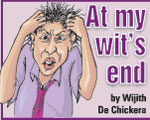Something's happening. Under our noses, our society is changing. We raid children's homes (whose patron was a living saint) over allegedly outdated registers, while a host of illicit businesses under rumoured political patronage are seen to flourish.
Many covetous eyes are being cast at potentially lucrative assets, and actions to expropriate the same follows in quick succession - despite state assurances that the 'acquisition bill' was a one-off event, and despite the demonstrable existence of a plethora of other government-controlled enterprises that are underperforming. There is no sure-fire way of distinguishing thugs on the street from elected representatives of the people, because it is gangsters and hooligans who rule the roost in parliament.
 |
The writing is on the wall. The executive is pressing its agenda with hardly a challenge to its hegemony in a panoply of spheres where its political will and writ run strong. The legislature is in a shambles, as most recently evidenced by the imbroglio during the budget presentation - by dint of which debating fiscal policy was passed over in favour of discussing the physical 'policing' to which the opposition was subjected. The judiciary has perhaps unwittingly contributed to the shrinking of democratic space in the land by virtue (we use the word advisedly) of its assent to authoritarian regimentation in a number of key instances - detention of "war IDPs", compulsory military training for varsity undergrads, the so-called assets bill. Let those who have eyes see.
Fearing that this is the shape of things to come, what's left of the political opposition has put up its shutters and closed shop. The emasculated party of the right fails to realise or admit its own political bankruptcy and appeals on the one hand to internationalism, and on the other to patriotism. Both appeals are doomed to abject disregard, as neither polity nor the powers are swayed by either the spectre of global disapprobation; or moved by an emotive sphere ("patriotism") which the state picked early as the battlefield, moved swiftly to occupy, and now monopolises.
The eviscerated party of the left maintains a conspicuous silence on the judgment of a general who was once its joint opposition candidate at the general election. The emboldened party of the first part - encouraged by the pusillanimity of its parliamentary nemeses, and empowered by the silent compliance of civil society - grows stronger in its gumption. Only few rugged individuals of a yet-to-be tried and tested party just recently rehabilitated into the political mainstream dare to stand their ground, and having done their part to withstand the slings and arrows of the outraged powers that be.
For their part, the vast majority of the people of the late great republic appear to have abdicated their will, vision, dissension, contribution, and conscience in favour of a bureaucratic apparatus that is becoming increasingly patrimonial. The powers that be, having capitalised splendidly on the chauvinistic rhetoric of a conflict prosecuted to the hilt with no small measure of success (as the outcome was measured), have now perhaps realised that populist responses to their public posturing cannot be relied on to continue ad nauseam. Thus a concerted effort to arrogate, establish, and consolidate more bulwarks and bastions of power, exercising the right of the state to define what's best for all and sundry in the national interest.
In the limit, with the continuing closure of a series of avenues for dissent and critique, the opportunity is rife for a clutch of alternative forms and forums of expression to intervene. Interest in lobbying and protest having declined, the advent of new social media may offer citizens with a vibrant fresh instrumentality. While the masses may be constrained to suffer the winter of their discontent in sullen silence; the literati, the intelligentsia, and the cognoscenti give full vent to their feelings in posts, tweets, and the like. We may be far from a 'Sri Lankan spring' to correspond to recent eventualities in the Middle East, but there is still hope that the nation is talking to itself. Pity there are so few citizens left to discern that something, indeed, is happening. The hoi polloi, regrettably, are ignorant and apathetic as to why they are (think they are) none the worse in general for thugs in mufti among the thrones, powers, and principalities. |


